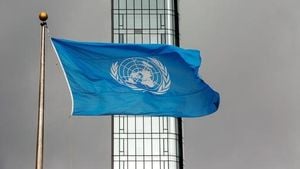Two stories—one unfolding in Pennsylvania, the other spanning the Atlantic to Ghana—are casting a harsh spotlight on the human cost of shifting U.S. immigration enforcement priorities under President Donald Trump’s administration. Together, they reveal the tangled web of policy, law enforcement, and the vulnerable lives caught in the middle.
On September 22, 2025, Pennsylvania Attorney General Dave Sunday announced the rescue of two Latina minors, aged just 14 and 17, from what authorities described as a harrowing ordeal of forced labor and exploitation in Chester County. According to EL PAÍS, the girls’ alleged trafficker, Ramiro Caal Jolomna, now faces charges of human trafficking, involuntary servitude, and related offenses. The case is grimly illustrative of a broader trend: while the girls were forced to work without pay under threat of deportation, experts warn that countless similar cases remain hidden from public view.
The details are chilling. The 14-year-old, brought from Mexico, was compelled to work 16-hour shifts, seven days a week, with her wages funneled directly to Caal Jolomna and his wife. She was also forced into domestic servitude, cleaning her employer’s home. The 17-year-old, sponsored from Guatemala, endured similar conditions. Her hope of supporting her ailing father and family back home was dashed when most of her earnings were taken by her sponsor.
Yet, as shocking as the Pennsylvania case is, it is not an isolated incident. According to the CATO Institute, since Trump’s return to the White House, a staggering 42,153 personnel—including 28,390 federal law enforcement officers—have been reassigned to assist U.S. Immigration and Customs Enforcement (ICE). This redirection of resources, EL PAÍS reports, has severely undermined the government’s ability to combat labor and sexual exploitation. David J. Bier, Director of Immigration Studies at CATO, did not mince words: “This diversion has significantly curtailed the government’s capacity to address criminal activity in the United States.”
The impact is felt at every level. The State Department’s Office to Monitor and Combat Trafficking in Persons (TIP)—the lead agency for federal anti-trafficking efforts—has seen its staff slashed by more than 70%. A memorandum from Congressman Jamie Raskin, submitted on September 16, 2025, says that “roughly half of the federal law enforcement personnel who might be assigned to track terrorists, human traffickers, and other criminals have now been assigned exclusively to immigration enforcement.”
For those on the front lines of the anti-trafficking fight, the consequences are dire. The Department of Justice has canceled hundreds of grants that previously helped state and local agencies prevent violent crimes and support survivors of sexual and domestic violence. Meanwhile, the Trump administration has shuttered agencies such as USAID, which once gathered vital intelligence on trafficking networks.
Even agencies with a direct mandate to combat human trafficking have been hollowed out. CATO’s data shows that nearly 17,000 personnel from other agencies—including 14,500 federal law enforcement officers—have been diverted to ICE. The numbers are eye-opening: one in five federal marshals, one in five FBI agents, half of DEA agents, more than two-thirds of ATF agents, and nearly 90% of Homeland Security Investigations (HSI) personnel are now assigned to immigration enforcement. In 2023, HSI managed to rescue 1,806 children and arrest 4,214 suspects for sexual exploitation crimes. Now, with 90% of the agency focused on immigration, these efforts have “all but stopped,” as Raskin’s memorandum starkly put it.
Despite these warnings, the Trump administration has downplayed the fallout. Tricia McLaughlin, Department of Homeland Security assistant secretary, told The Guardian that under President Trump and DHS Secretary Kristi Noem, the U.S. is “dismantling sex trafficking networks and saving children from sexual exploitation and abuse.” But critics, like Raskin, see a different picture entirely. In his memo, bluntly titled “Epstein is the Tip of the Iceberg: The Trump Administration is Dismantling the Anti-Human Trafficking Infrastructure and Coddling Human Traffickers, Sexual Predators, and Rapists,” Raskin wrote, “President Trump has aligned himself with human traffickers, sexual predators, and other violent criminals. The pattern is obvious, it is alarming, and it is a far bigger problem than the files of Jeffrey Epstein.”
While the U.S. struggles with its own enforcement priorities, the ripple effects are being felt thousands of miles away in West Africa. On September 5, 2025, the Trump administration deported 14 West African migrants to Ghana under a third-country deportation deal, according to Foreign Policy. By September 23, 11 of these migrants had been deported again—some to their home countries, where they feared for their safety. The migrants had been suing the Ghanaian government for unlawful detainment, but their case was dismissed after their removal.
Ghana’s government claimed all 14 migrants had been sent back to their countries of origin, but court documents revealed a more complex picture: the group included nationals from Liberia, Mali, Togo, Nigeria, and Gambia. The process has been marred by confusion and controversy, with opposition lawmakers in Ghana arguing that the U.S. deal is unconstitutional and risks aligning the country with what they describe as a “harsh and discriminatory” U.S. immigration enforcement regime.
Five of the deportees have filed a separate lawsuit against the U.S. government, alleging they were confined in straitjackets for 16 hours during their flight to Ghana and subjected to “squalid conditions” upon arrival. Ghanaian Foreign Minister Samuel Okudzeto Ablakwa said the country expects 40 more deportees from the U.S. in the coming days. The deal, struck under pressure from Washington after the Trump administration imposed major visa restrictions on Ghanaians in July 2025, remains shrouded in secrecy. Human Rights Watch has raised alarms, warning that such third-country deportation deals—now also in place with Eswatini, Rwanda, South Sudan, and Uganda—may violate international law. The Rwandan deal reportedly includes $7.5 million in U.S. support, while Eswatini’s brings $5.1 million for “border and migration management capacity.”
Allan Ngari, Africa advocacy director at Human Rights Watch, called on the African Union to “reiterate that deportations that do not afford people an opportunity to seek protection from persecution or torture are unlawful, abusive, and unacceptable.”
As the U.S. ramps up deportations and diverts resources away from anti-trafficking efforts, the fate of vulnerable migrants and trafficking victims hangs in the balance. The stories from Pennsylvania and Ghana, though separated by thousands of miles, are bound by a common thread: the real-world consequences of policy choices made far from the lives they affect most.
For the two Latina girls freed in Pennsylvania, the ordeal is over—but for many others, the struggle continues, often out of sight and out of mind.





